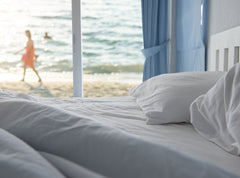How to sleep better in hot weather
 The hottest time of the year is here, and you might be having trouble balancing a comfortable temperature with a high energy bill (and footprint). There’s more to getting better sleep than just staying cool. Summer schedules call for different methods to make sure you’re getting enough quality rest.
The hottest time of the year is here, and you might be having trouble balancing a comfortable temperature with a high energy bill (and footprint). There’s more to getting better sleep than just staying cool. Summer schedules call for different methods to make sure you’re getting enough quality rest.
Stay on schedule
It can be easy to get out of your regular routine. With increased activity and longer days, you may not be following your normal schedule. If you have a pre-bedtime routine (and you should), try to keep that consistent so that you’re giving your body the signals it’s used to for winding down and relaxing to prepare for sleep.
Try to stick to it, even if it means making sacrifices. If you’re doing more activities, cut out some screen time or chores to make sure you’re in bed on time. If you attempt to do it all you’re more likely to stay up too late. This goes for kids as well. It’s good for their health, but also helps with the transition back to school hours.
Be aware of your light exposure
Our bodies are wired to sleep when it’s dark, so a later sunset means you may not feel tired at your usual time. Get sunlight in the morning when you usually get up, and then get out of the sun and dim the lights when it’s time to start winding down. Make sure that you have good curtains or blinds that can block out the lingering sun. Some people can even suffer from seasonal affective disorder during the summer instead of the winter. For those people, increased light exposure can make their symptoms worse.
Spend time outside
Take advantage of the nice weather and beautiful scenery by enjoying your yard, exploring your local parks, and going camping. Increased activity leads to better sleep, and will help make sure you’re tired when it’s time to get in bed. Getting out in in nature reduces stress and can help with depression, both of which interfere with your sleep.
Moderate your food and drink
With vacations and social events comes more food and drinks. Unfortunately those can impact how well you sleep. Try to stop eating about three hours before bedtime. Caffeine of course will keep you up, but many people don't know that alcohol interferes with REM so you don’t get restful sleep. Avoid anything that your body has trouble digesting. If it has to work hard there, it’s not relaxed – not to mention the unpleasant side effects of gas or indigestion that can keep you up at night.
Change up your bedroom
There may be some easy things you can do to stop heat from lingering. Lighter colors and fabrics will help, so you may want to swap out your sheets and remove the heavy blankets on the bed. Clear out the clutter to open up the space for air flow. Store the extra throw pillows and blankets, and maybe even area rugs.
You spend most of your time in your bed, so make sure it’s updated for hot weather sleeping. If your mattress doesn’t include cooling features like ventilated foam or gel, you may want to look into a replacement. For sheets and pajamas, use cotton, silk or polyester to promote better ventilation and air flow.
Home remedies
When all else fails, try some simple tricks that have been around for decades:
- Put your sheets in a plastic bag in the freezer so they stay cooler for longer.
- Place a block of ice in a pan in front of your pan to cool the air that’s blowing on you.
- Cool your bed by using a hot water bottle. Freeze the water inside and slip it into your sheets, or even against your skin.
- Take a quick shower before bed, especially if that time outside has you covered in sunscreen and bug spray. A cool shower can lower your body temperature and relax you.
Above all, make sure you’re comfortable. If your bed is already causing discomfort, it’s going to be worse in heat and humidity.

